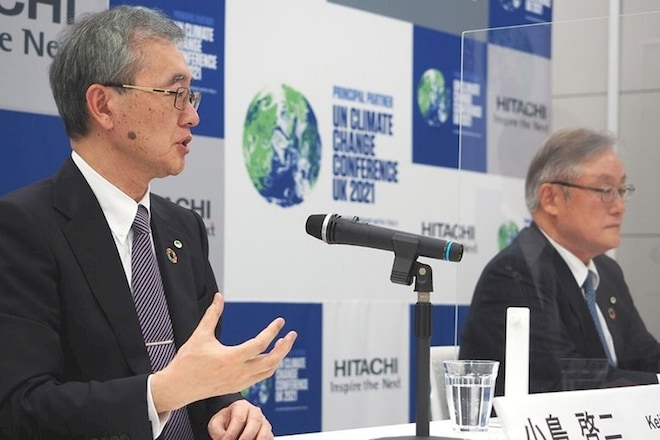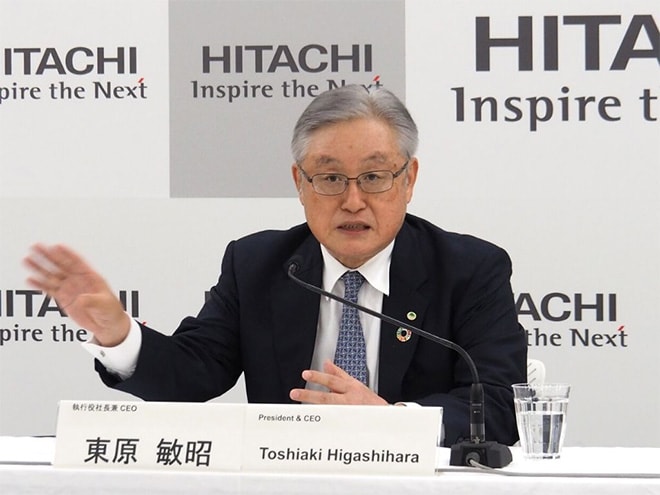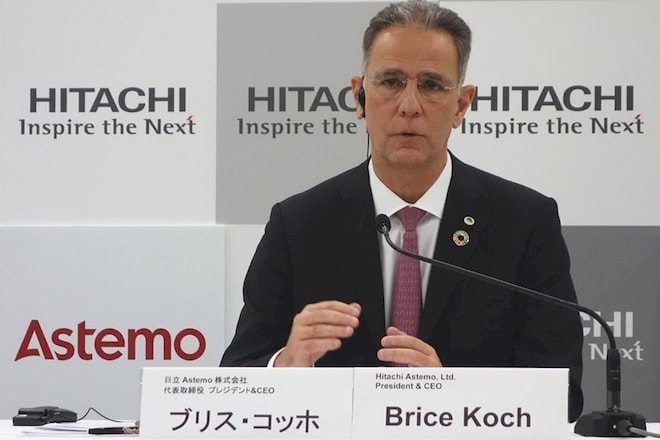Hitachi Announces Progress of Mid-term Management Plan and Policies for the Future
Apr. 29, 2021
Makiko Yabe

- Table of Contents
-
- Accelerating digital transformation (DX) through the acquisition of GlobalLogic
- Solving society’s challenges with Lumada and further deployment
- Strengthening shareholder returns
- Record net income for the fiscal year driven by the IT segment
- V-shaped recovery with increased sales and profits in FY2021
On April 28, 2021, Hitachi, Ltd. announced the progress of its 2021 Mid-term Management Plan. After discussing synergies and other aspects of Hitachi's acquisition of U.S. IT company GlobalLogic, which is to be completed in July 2021, Toshiaki Higashihara, President & CEO of Hitachi, Ltd. said: "We will find solutions to the challenges of society by evolving Lumada and pursuing collaborative creation with customers."
On the same day, Hitachi’s consolidated financial results for the fiscal year ending in March2021 were also announced. It was revealed that net income (501.6 billion yen) and cashflow margin from operating activities (9.1%) reached record highs.
Accelerating digital transformation (DX) through the acquisition of GlobalLogic
The Mid-term Management Plan was announced in May 2019 as a three-year plan whose final year is fiscal year 2021. During the announcement, Higashihara set forth three points of focus: “Environment”, “Resilience” (i.e., the ability to adapt to environmental changes and crises), and “Safety & Security”.
The plan defined a stance in which the five business sectors of IT, Energy, Industry, Mobility, and Life, as well as automobile parts manufacturer Hitachi Astemo will join forces to address these three key areas by utilizing know-how and digital technologies cultivated over many years in the development of solutions for social and corporate management challenges.
In 2016, Hitachi began delivering Lumada—a unique digital solutions platform that proposes solutions to customer challenges—while simultaneously pursuing globalization through enterprise integration.
Part of this involved the acquisition of the power grid business of Switzerland's major heavy electric company, ABB, leading to the start of operations of Hitachi ABB Power Grids Ltd., in July 2020. Speaking on the benefits of integration, Higashihara said that "We will leverage this to strengthen our environmental business, including digital grids and high-voltage direct-current transmission (HVDC) that enable efficient power transmission and distribution of renewable energy, and deploy it globally."
The acquisition of GlobalLogic, a digital engineering services company in the U.S., scheduled for July 2021, will entail an acquisition value exceeding 1 trillion yen, at 9.6 billion U.S. dollars, making it one of Hitachi's largest investments ever. Speaking on the synergistic effects of this acquisition, Higashihara said that "it will enable us to accelerate the digital transformation of our customers."
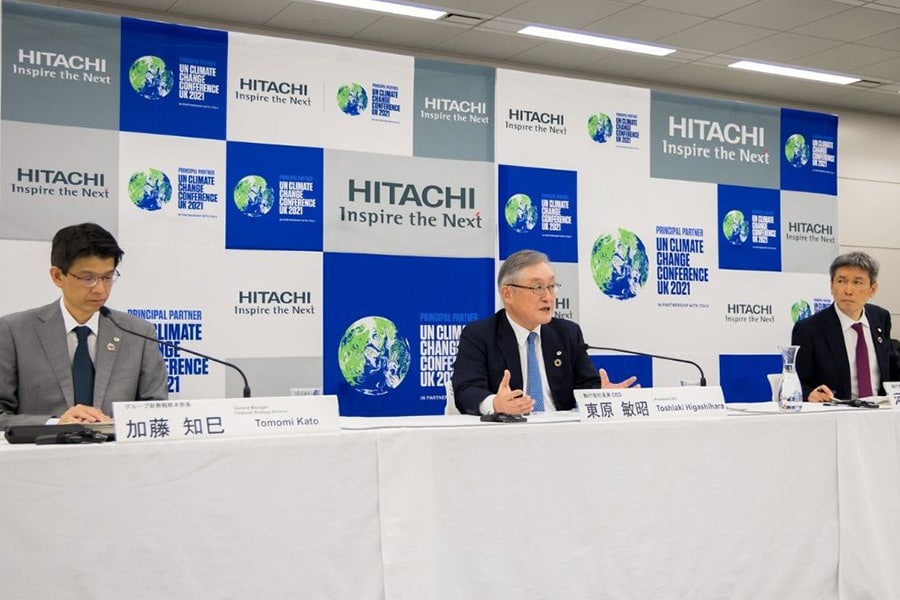
Solving society’s challenges with Lumada and further deployment
Lumada, a platform that proposes digital solutions for a variety of customers, is at the core of the globalization of Hitachi's business. When asked about the strengths of Lumada during the Q&A session, Higashihara gave the example of how a U.S. truck leasing company was using Lumada for its maintenance operations.
At this company, status of their trucks is gathered and analyzed as big data. Artificial Intelligence (AI) then forecasts what parts may break down when, and proposes their preemptive replacement. It also makes it possible to accomplish maintenance in shorter times by designating a maintenance factory where replacement parts are sent in advance and repairs are carried out.
After explaining this solution, Higashihara said that "This is one example of solving challenges by leveraging Lumada's big data analysis and AI. Hitachi's strategy is to 'containerize' such solution for further deployment."
Strengthening shareholder returns
Regarding future prospects, Higashihara explained that "In FY2022, we want to make it so that both the operating profit ratio and ROIC (return on invested capital) exceed 10%." Regarding the allocation of funds, he said that the company, as it continues a certain level of growth investment, will "further strengthen shareholder returns based on business growth."
After explaining the company's policy of continuing to pursue management that emphasizes ESG, Higashihara concluded his announcement on the progress of the Mid-term Management Plan as follows:
"Focusing on our Social Innovation Business, which applies a digital approach to finding solutions to social and corporate challenges in the fields of the Environment, Resilience, and Safety & Security, we will achieve sustained growth."
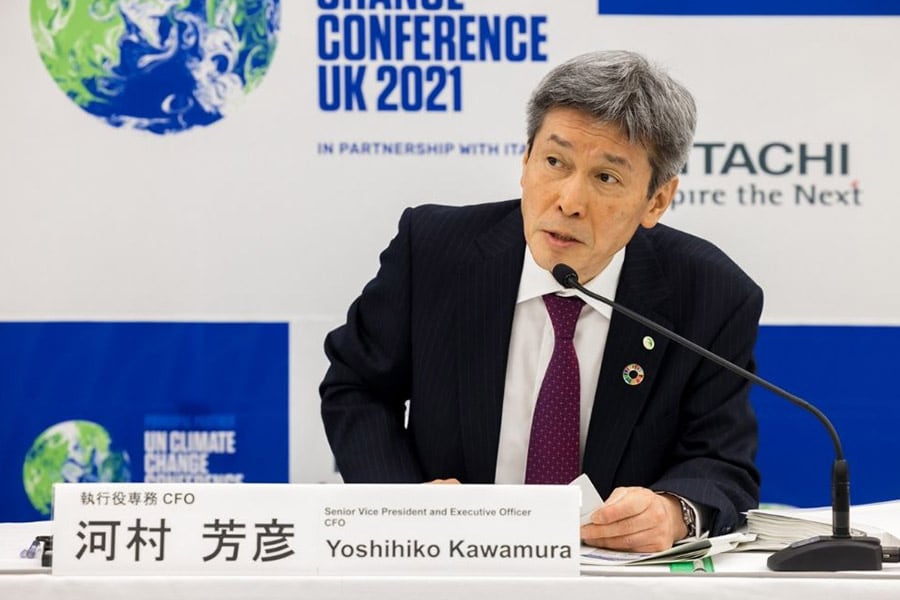
Record net income for the fiscal year driven by the IT segment
Consolidated financial results for the fiscal year ending March 31, 2021 achieved a record high both in terms of a net income of 501.6 billion yen and a cashflow margin from operating activities of 9.1%. Although revenue decreased slightly to 8.7291 trillion yen compared to the previous fiscal year (8.7672 trillion yen) due to the impact of COVID-19 and other factors, net income attributable to Hitachi, Ltd. stockholders increased to 5.7 times the previous fiscal year's level (87.5 billion yen) due in part to the strong performance of the IT segment with the Lumada business at its core.
Cashflow management contributed to the increase in profits. Hitachi increased cashflow from operating activities from 560.9 billion yen in the previous fiscal year to 793.1 billion yen, and the cashflow margin rose from 6.4% to a record high of 9.1%.
At the same time, Hitachi is also implementing cost structure reform. Using Hitachi ABB Power Grids' shared service, Hitachi consolidated its procurement, general affairs, and financial functions with the goal of reducing costs by a total of approximately 100 billion yen by FY2025.
V-shaped recovery with increased sales and profits in FY2021
Yoshihiko Kawamura, Senior Vice president and CFO of Hitachi, Ltd., who explained the financial results, said that Hitachi "aims to further expand the Lumada business" with a view toward sales growth in FY2021. In the field of industry, he said that, due to collaborative creation with Workman, a seller of work clothes and outdoor goods, the introduction to all stores of a system that automatically orders as many as 100,000 items is set to start.
A case was also presented regarding Hitachi Astemo, which was launched in January of this year. Its over the air (OTA) software update solution was adopted for the new model of the Honda Legend, the world's first Level 3 automobile, which is capable of autonomous driving under generally normal conditions.
Based on the acceleration of these developments, Lumada business sales in FY2021 are forecast to grow by 42% from the previous fiscal year (1.11 trillion yen) to 1.58 trillion yen—a goal that Hitachi expressed confidence in achieving.
The consolidated total result for FY2021 is forecasted to be 9.5 trillion yen in revenue and 740 billion yen in adjusted operating income. The combined operating margin of the five sectors and Hitachi Astemo is expected to increase from 6.5% in FY2020 to 8.3% in FY2021. Net income for the current fiscal year is forecast to reach a record high of 550 billion yen, and ROIC is expected to increase to 8.3% from the 6.4% of the previous fiscal year.
Expressing his enthusiasm, Kawamura said that "We will increase sales and profits from FY2020 to FY2021. After bottoming out in FY2020, we will make a V-shaped recovery."

